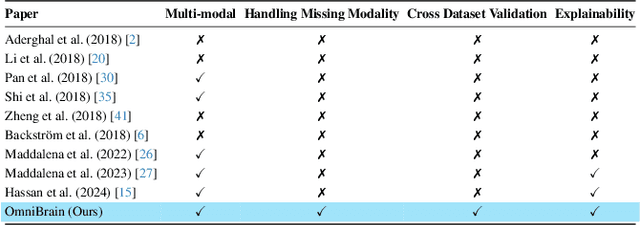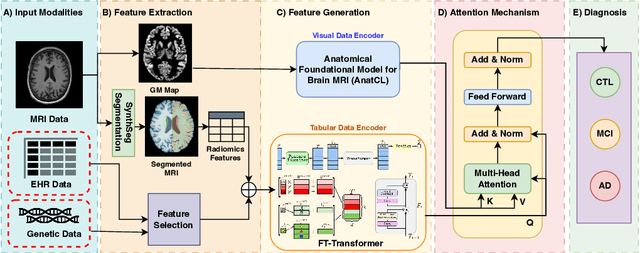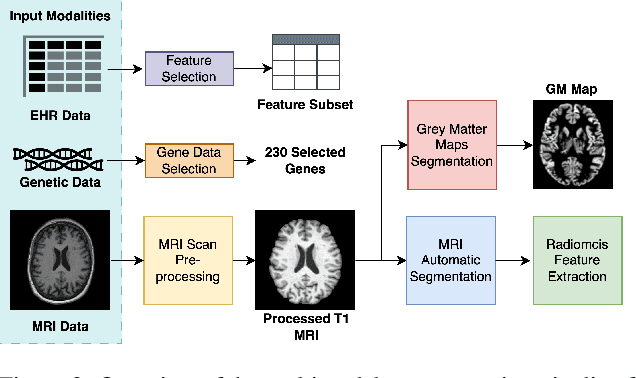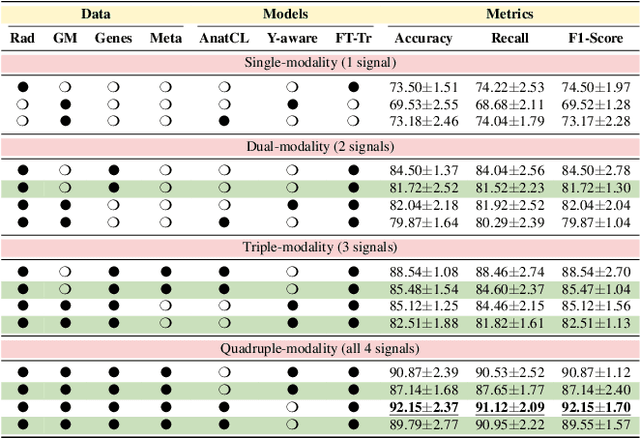Salma Hassan
Not Only Grey Matter: OmniBrain for Robust Multimodal Classification of Alzheimer's Disease
Jul 28, 2025



Abstract:Alzheimer's disease affects over 55 million people worldwide and is projected to more than double by 2050, necessitating rapid, accurate, and scalable diagnostics. However, existing approaches are limited because they cannot achieve clinically acceptable accuracy, generalization across datasets, robustness to missing modalities, and explainability all at the same time. This inability to satisfy all these requirements simultaneously undermines their reliability in clinical settings. We propose OmniBrain, a multimodal framework that integrates brain MRI, radiomics, gene expression, and clinical data using a unified model with cross-attention and modality dropout. OmniBrain achieves $92.2 \pm 2.4\%$accuracy on the ANMerge dataset and generalizes to the MRI-only ADNI dataset with $70.4 \pm 2.7\%$ accuracy, outperforming unimodal and prior multimodal approaches. Explainability analyses highlight neuropathologically relevant brain regions and genes, enhancing clinical trust. OmniBrain offers a robust, interpretable, and practical solution for real-world Alzheimer's diagnosis.
MINDSETS: Multi-omics Integration with Neuroimaging for Dementia Subtyping and Effective Temporal Study
Nov 06, 2024



Abstract:In the complex realm of cognitive disorders, Alzheimer's disease (AD) and vascular dementia (VaD) are the two most prevalent dementia types, presenting entangled symptoms yet requiring distinct treatment approaches. The crux of effective treatment in slowing neurodegeneration lies in early, accurate diagnosis, as this significantly assists doctors in determining the appropriate course of action. However, current diagnostic practices often delay VaD diagnosis, impeding timely intervention and adversely affecting patient prognosis. This paper presents an innovative multi-omics approach to accurately differentiate AD from VaD, achieving a diagnostic accuracy of 89.25%. The proposed method segments the longitudinal MRI scans and extracts advanced radiomics features. Subsequently, it synergistically integrates the radiomics features with an ensemble of clinical, cognitive, and genetic data to provide state-of-the-art diagnostic accuracy, setting a new benchmark in classification accuracy on a large public dataset. The paper's primary contribution is proposing a comprehensive methodology utilizing multi-omics data to provide a nuanced understanding of dementia subtypes. Additionally, the paper introduces an interpretable model to enhance clinical decision-making coupled with a novel model architecture for evaluating treatment efficacy. These advancements lay the groundwork for future work not only aimed at improving differential diagnosis but also mitigating and preventing the progression of dementia.
Multi-modal Medical Image Fusion For Non-Small Cell Lung Cancer Classification
Sep 27, 2024Abstract:The early detection and nuanced subtype classification of non-small cell lung cancer (NSCLC), a predominant cause of cancer mortality worldwide, is a critical and complex issue. In this paper, we introduce an innovative integration of multi-modal data, synthesizing fused medical imaging (CT and PET scans) with clinical health records and genomic data. This unique fusion methodology leverages advanced machine learning models, notably MedClip and BEiT, for sophisticated image feature extraction, setting a new standard in computational oncology. Our research surpasses existing approaches, as evidenced by a substantial enhancement in NSCLC detection and classification precision. The results showcase notable improvements across key performance metrics, including accuracy, precision, recall, and F1-score. Specifically, our leading multi-modal classifier model records an impressive accuracy of 94.04%. We believe that our approach has the potential to transform NSCLC diagnostics, facilitating earlier detection and more effective treatment planning and, ultimately, leading to superior patient outcomes in lung cancer care.
 Add to Chrome
Add to Chrome Add to Firefox
Add to Firefox Add to Edge
Add to Edge